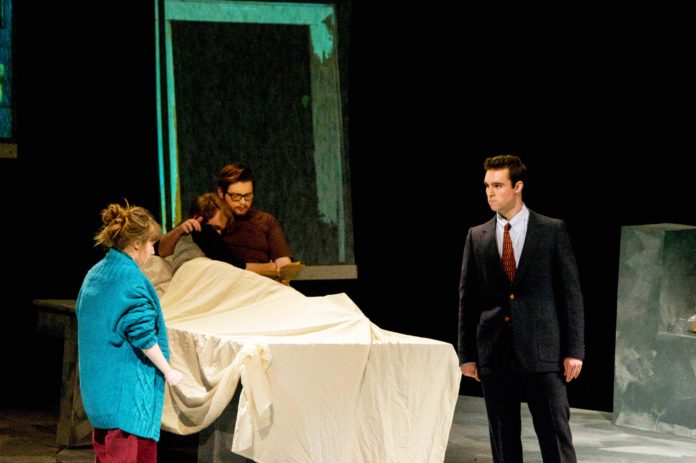
Audiences were left grappling with political corruption, racial tensions, religious conflict, and an emotional, ambiguous ending in Tony Kushner’s ‘Angels in America, Part One: Millennium Approaches,’ directed by DePauw Theatre’s Steve Timm, professor of communications and theatre.
“Part One: Millennium Approaches” is the first half of Kushner’s play “Angels in America: A Gay Fantasia on National Themes,” which is succeeded by “Angels in America: Perestroika.”
Set in 1985 during the Reagan era in New York, Prior Walter, played by senior Billy Burke, tells his boyfriend, Louis Ironson, played by junior Drew Smith, that Prior has AIDS.
Meanwhile, closeted gay Mormon Joe Pitt, played by sophomore Aidan Catellier, struggles with pressure from his boss Roy Cohn, played by senior Jeremy Boyd. Joe has to choose between accepting a job offer in Washington D.C. or staying in New York with his wife Harper Pitt, played by senior Hannah Gauthier. Roy Cohn is also a closeted gay lawyer, who is diagnosed with AIDS. The three groups intersect when Joe meets Louis at work, and Harper meets Prior in a hallucination.
“Part One” of the two-part production comments on the complex themes of community, mental health and elements of identity such as one’s race, ethnicity, religion and sexuality and political affiliation.
At the center of “Angels in America” is a gay relationship and a closeted gay man in a heterosexual relationship. Catellier said Joe’s coming out process and his relationship to Louis is an important plot line of the play.
“There are a lot of parts where Joe is coming out to people and talking about his sexuality, but he does it in a very weird way,” Catellier said. “I think it [relationship to Louis] is important because it is part of Joe’s process of coming out, especially because he’s kept it [his sexuality] so locked up against everything that he has been taught.”
Burke, who plays Prior, said the representation in “Angels in America” is a commentary to the Reagan era’s opinion on the AIDS epidemic and queer community. “Kushner was writing it in somewhat of a response to the AIDS epidemic...because it was such an epidemic, it was a plague and it was ignored for so long by our government, by our president,” Burke said. “Reagan attempted to defund AIDS research several times...so the queer community was not treated well during the AIDS epidemic from any side.”
Timm said that “Angels in America” has a direct relevance to DePauw before the emergence of United DePauw, a student-run alliance with the LGBT community.
“In the early 90s, prior to United DePauw, we had people...who lived in fear on campus, and were afraid to come out,” Timm said. “So, in the 25 years that’s passed, things have changed somewhat. And yet, I still think there is work to be done, and there’s always going to be work to be done.”
Another piece of “Angels in America” grapples with mental health in Joe’s wife, Harper Pitt. Gauthier, who plays Harper, says she is not just a “crazy character.” “She is sane, she is lucid, she just isn't getting the help she needs,” Gauthier said. “Harper is a great example of women not being taken seriously by mental health professionals, she is also so much more than her illness and I hope I was able to convey that.”
Politics flow deep through the entire narrative of “Angels in America.” Boyd says his character Roy speaks to the deeply rooted loyalty for followers of Reagan in the 1980s.
“What really defines Roy is loyalty. No matter what happened in Roy’s life, he was loyal to the people around him,” Boyd said. “He’s kind of [the] pre-lobbyism that really grew out of the American political system, but also the Reagan era...that we are still feeling the backlashes of today.”
Timm said “Angels in America” showed another side to the Reagan Era in America. “The play is very critical of the ‘80s, the Reagan administration and its an implicit kind of criticism that has to do with the other side of AIDS that we don’t see,” Timm said. “The love between people, the care, the suffering...that the Reagan administration didn’t care particularly about.”
Boyd and Burke said that “Angels in America” educates audiences on an important piece of American history that has been written out of the textbooks: the AIDS epidemic.
“It’s also based around American history that is not commonly discussed, that millions of people in America, millions of people across the world, went through and really suffered with...and people act like it didn’t happen,” Boyd said. “It’s really important to honor those memories when we don’t honor them in the current systems that we have in place.”
Boyd and Burke argue “Angels in America” is vital, even more, because of the current polarizing political and social state America is in. “It’s really interesting to think that this show was written 25 years ago,” Boyd said. “...and it’s so powerful because it feels like it was written yesterday.”
Both Boyd and Smith believe that “Angels in America” is powerful because it can impact all types of people. “Because no matter who you are, no matter where you are you have something you can take away [from the play],” Boyd said. “There’s a lot of larger connections to things that we’re not necessarily a part of.”
Timm believes that performances like “Angels in America” are meant for the liberal arts education, which is one reason why he chose to direct the play. “It [‘Angels in America’] brings up issues...that, as a liberal arts institute, we are obligated to confront,” Timm said. “If we aren’t the think tank for 18-22 year olds, then I don’t know who is.”

